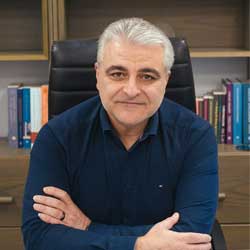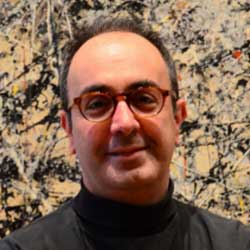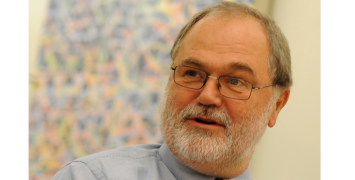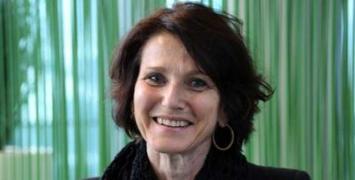Greek perspective from a new ERC Vice President

We spoke to Professor Nektarios Tavernarakis about his new role as Vice-President of the ERC, his research into ageing, and his conviction that Europe needs “more ERC”.
Could you share an overview of your scientific background and research career?
As far back as I can remember, I was always driven by an insatiable curiosity to understand the inner workings of the world. Admittedly, sometimes maybe a bit too much for my own well-being! I recall vividly my childhood attempts to build a Tesla coil and the painful experience of coming in contact with lethal high voltages.
I recall vividly my childhood attempts to build a Tesla coil and the painful experience of coming in contact with lethal high voltages.
I also remember the joy I felt, when it finally worked and generated spectacular arcs! To a great extent, I owe what I have accomplished to my parents who, appreciating the value of education and knowledge, encouraged me to pursue this path so far, as well as, to the brilliant teachers and mentors I was very fortunate to have throughout my career.
 Nektarios Tavernarakis, Professor,
Nektarios Tavernarakis, Professor,Medical School,University of Crete &
Chairman, Foundation for
Research and Technology-Hellas
One of my early mentors was Fotis Kafatos, an ERC pioneer and the first President of the ERC Scientific Council. I consider proper mentoring as the most important factor for a successful career in academia and research. Also, of particular importance have been the opportunities I was offered to pursue my interests and to realize my research goals. After completing my graduate studies at the Aristotle University of Thessaloniki, where I had the good fortune to be taught by highly motivated professors, I pursued my doctoral studies at the University of Crete. I was again fortunate to perform my PhD research at the neighbouring Institute of Molecular Biology and Biotechnology (IMBB), of the Foundation for Research and Technology – Hellas (FORTH), where Fotis Kafatos was Director, at the time. I was extremely lucky to work with scientists of such calibre, and become embedded in a vibrant research ecosystem, located in my home city, Heraklion, in Crete, Greece.
After a few years of postdoctoral research in the United States, I came back as an independent researcher at IMBB and a professor at the Medical School of the University of Crete. Starting my independent career in Greece’s premier research institution that offers a multidisciplinary research environment has been a milestone that afforded me the opportunity to pursue my ideas and build a productive research group.
What is your research about?
Our efforts concentrate on a fundamental question of modern ageing research: What mechanisms underlie age-related neuronal function decline?
Our research lab mainly focuses on the molecular mechanisms and cellular signalling pathways governing neurodegeneration, and ageing. Ageing is associated with marked decrease of neuronal function and increased susceptibility to neurodegeneration. In human populations, this is manifested as an ever-increasing prevalence of devastating neurodegenerative conditions, such as Alzheimer’s and Parkinson’s disease, stroke, several ataxias, and other types of dementia. Development of therapeutic interventions against these maladies, which are a major contributor to human disability in modern societies, is, thus, becoming a pressing priority. However, although age-related deterioration of the nervous system is a universal phenomenon, its cellular and molecular underpinnings remain obscure. Our efforts concentrate on a fundamental question of modern ageing research: What mechanisms underlie age-related neuronal function decline? Through these studies, we aim to expand our understanding of age-related neurodegeneration, and provide critical insights, with broad relevance to human health and quality of life.
You have been a member of the ERC Scientific Council since 2016. What motivated you to work for the ERC?
The ERC is already universally considered to be a major European success story. It stands as a radiant paradigm of how prudent investment in frontier research can reap enormous benefits for society and the scientific community. The ERC fosters creative and innovative thinking and stands as a beacon, when it comes to promoting scientific excellence and pioneering research. Having witnessed first-hand, as a grantee, the transformative impact of the ERC on European science, I am wholeheartedly committed towards contributing to its mission, in my capacity as a member of the ERC Scientific Council, and now as Vice-President.
What is frontier research and how important is it for you?
The COVID-19 pandemic has made it abundantly clear that global policy making strategies should prioritize investment in frontier blue skies research. Today, more than ever, the need for the ERC's support of bottom up, basic and applied research is even more relevant. Take, for example, the RNA vaccines that were recently developed and found to be more than 90% effective against the coronavirus. The technology, on which they are based, is the result of more than 20 years of basic research on RNA biology. Without such prior effort, there would have been no way a vaccine could have been developed in just a few months.
Likewise, the CRISPR-Cas technology, which was awarded the Nobel Prize in Chemistry a couple of months ago, is based on fundamental observations in humble bacteria, dating back to the late 1980s. No one suspected at that time the cataclysmic progress that would follow, more than 20 years later, with regard to the potentially disruptive applications based on this revolutionary technology.
The COVID-19 pandemic has made it abundantly clear that global policy making strategies should prioritize investment in frontier blue skies research.
What do you hope to achieve in your new role as ERC Vice-President?
First and foremost, I hope to build on what has already been achieved, and contribute further to the ERC’s raison d'être, which is the support of frontier research, on the basis of scientific excellence. My new responsibilities as ERC Vice President in the domain of Life Sciences will include the coordination of a number of actions, such as developing the overall ERC strategy, together with the other Members of the Scientific Council, as well as the identification of panellists for the evaluation of submitted proposals. As part of my Vice President duties, I will also be coordinating the ERC Standing Committee for Programme Impact Monitoring and Evaluation. This committee is responsible for implementing the monitoring and evaluation strategy of the ERC, in addition to reviewing the outcome of ERC activities.
Every year, the ERC evaluates many more excellent proposals that deserve support (about 30% more) than it can eventually fund.
As a member of the scientific community, I am unreservedly convinced that Europe needs “more ERC”. Every year, the ERC evaluates many more excellent proposals that deserve support (about 30% more) than it can eventually fund. This is quite disheartening to European scientists, and to those from all over the world, who want to come and do research in Europe. Strengthening the role of the ERC, as an instrument that supports research excellence across Europe is a prudent strategy towards reaping tangible societal benefits, and fortifying against unforeseen critical developments.
What do you see as the main challenges facing the ERC?
Coming from the Life Sciences, I have a strong appreciation of the interdisciplinary nature of modern research.
I have a strong appreciation of the interdisciplinary nature of modern research.
The explosive progress in the life sciences that we are witnessing in recent years is fuelled by technological and engineering advances, in diverse fields of study. For example, nowadays biomedical research extensively benefits from developments in physics, chemistry, mathematics, computer science and informatics, as well as social sciences.
In some cases, boundaries between domains and fields are fading, and we see that a large number of proposals involve elements spanning diverse research areas. The ERC welcomes and embraces such synergies. Indeed, the ERC Synergy funding scheme is purposefully designed to support synergistic efforts by groups of scientists, with complementary expertise, that come together to take on important scientific questions and challenges.
An additional challenge relates to “widening” the participation to the ERC funding schemes, that is, increasing the numbers of successful applications from scientists in countries that current host relatively few ERC grantees. The ERC is already making progress in this respect, as a point of reference for how to evaluate and fund frontier research.
Approaching sustainable development goals and battling unpredictable existential threats, akin to the current pandemic are, in my view, among the major global and European challenges, for the future. Rising to meet these challenges will require the concerted efforts of scientific communities across the globe. We are already witnessing such spontaneous, bottom up global coordination of research activities, in response to the COVID-19 crisis. In a very short period of time, the virus and its modus operandi have been characterized in great detail, and we even now have highly efficient vaccines and therapeutics. This is a truly amazing feat and speaks volumes about the power and value of scientific research.
Moreover, the technological advancements that are ushering in the new era of the 4th Industrial Revolution are the product of frontier research conducted decades ago. I believe it is critical to intensify investment in science education, in addition to supporting bottom up and basic and applied research. It is also important to consider thoroughly and wisely the ethical implications of innovative, cutting-edge technologies that are becoming available, at a pace that is difficult to assimilate. Europe needs to remain a major player and, for sure, reinforce its position in the global arena. The ERC should continue to be a catalyst for the consolidation of the European research area.
What would you recommend to Greece and other widening countries in order to increase their successful ERC proposals in the future?
It is only fair to say that the ERC has transformed the European research landscape and has become the golden standard of how to effectively support investigator-driven, frontier research, across all fields, on the basis of scientific excellence. As such, the ERC has influenced national research policies of many countries in Europe, including widening countries, serving as a model for setting up research funding agencies. This has increased competitiveness of several widening countries, as well as their participation in ERC funding schemes. Undoubtedly, there is still a lot of ground to cover on this front, but I believe we can safely say that ERC has been a driver of real convergence between widening and other countries in Europe.
The ERC has also provided inspiration for developing effective research funding policies in my own country, Greece. A case in point is the Hellenic Foundation for Research and Innovation (HFRI/ELIDEK), which was modelled on the ERC and commenced its operation in 2016. Already, HFRI has had a measurable impact on Greece’s research community, via funding schemes supporting young scientists and junior faculty, PhD students, and research infrastructures. In doing so, the HFRI has contributed significantly towards curtailing brain drain and brain waste, which is a thorny issue for Greek science.
HFRI has contributed significantly towards curtailing brain drain and brain waste, which is a thorny issue for Greek science.
Nevertheless, I do believe that Greece and widening countries can do much better. By prioritizing and supporting frontier research and science, at the national level, they can increase their international competitiveness substantially. I’d love to see more applications coming in from such countries. Understandably, to a large extent, this goal is contingent to also developing corresponding research support policies locally, at the national level, in these countries.
Greece has launched a funding programme, recently renamed as “Always pursue Excellence - Theodoros Papazoglou”, for research projects that succeeded in ERC evaluations but which did not get funded. Can you tell us more about it and are there any other examples of such good practice?
The funding scheme “Always pursue Excellence - Theodoros Papazoglou”, is an initiative of HFRI that was launched in 2020, in memory of the distinguished colleague, friend and head of the team supporting the ERC’s Scientific Council, Theodore Papazoglou. The programme aims to support Greek Researchers who submitted research proposals to the ERC Funding Schemes, Starting, Consolidator and Advanced Grant from 2018 onwards, have been favourably evaluated during the second phase of the proposal evaluation process, but were not eventually funded due budget limitations (the so called “unfunded As”).
The funding scheme “Always pursue Excellence - Theodoros Papazoglou” was launched in 2020.
This HFRI action was designed to support these exceptional researchers, in their efforts to develop their research further and re-submit a proposal to the ERC. The action is co-funded by the Stavros Niarchos Foundation (SNF) and HFRI. Just a few weeks ago, five researchers received support from this initiative. I should say that Greece had also implemented a similar scheme for supporting unfunded “As” during the EU’s last Research and Innovation funding programme. There are currently discussions on expanding the recent scheme (in memory of Theo Papazoglou) to include all ERC proposals that advance to stage two of the evaluation. FORTH has also established an intramural funding scheme inspired by the ERC Synergy grants, which we are now expanding to include an annual award in his memory.
 Theodoros Papazoglou
Theodoros Papazoglou
I cannot imagine better ways to commemorate Theo, who had devoted all his energy to the ERC’s mission and was himself a distinguished researcher. I had the good fortune of collaborating with him in the early 2000s, during my first years at the Foundation for Research and Technology, in Heraklion, Crete, where he was conducting research at the time. Years later, I was fortunate to work with Theo again as a member of the ERC Scientific Council. His deep knowledge and understanding of the ERC’s “DNA”, as well as his dedication to the ERC cause are truly, sorely missed.
Previous interview with Nektarios Tavernarakis (October 2018)





